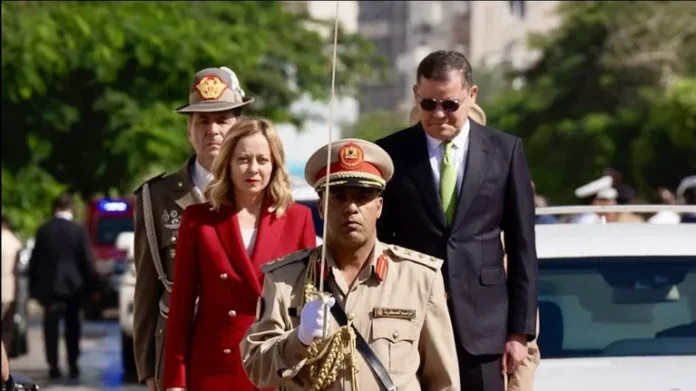Osama al Masri is known as the «Torturer of Mitiga,» named after the Tripoli prison where he is accused of committing murders, torture, and sexual violence.
Soldecanarias.net / Adeje
The Italian Prosecutor’s Office has formally opened an investigation into Prime Minister Giorgia Meloni and several members of her government over the deportation of Libya’s Chief of Judicial Police, Osama al Masri, who is wanted by the International Criminal Court (ICC) for war crimes and crimes against humanity. He had been detained in Italy but was released due to procedural errors.
Meloni confirmed in a social media message that she had received the notification of the investigation from Prosecutor Francesco Lo Voi. The notification was also reportedly sent to Minister of Justice Carlo Nordio, Minister of the Interior Matteo Piantedosi, and Undersecretary of the Presidency Alfredo Mantovano.
The judiciary seeks to clarify the events that led to Al Masri’s release and repatriation on the night of January 19. He had been arrested in the Italian city of Turin. Prosecutors are investigating whether these members of the Italian government may have committed crimes of concealment and embezzlement, as the Libyan enforcer was transported on an Italian state aircraft to the Libyan capital, Tripoli, where he received a hero’s welcome.
The Prime Minister defended her government’s actions and questioned the motives behind the case. She criticized Prosecutor Lo Voi, recalling his involvement in the trial against Matteo Salvini—who was ultimately acquitted in the Open Arms migrant ship blockade case. She also speculated that the complaint may have originated from lawyer and former left-wing politician Luigi Li Gotti, who has defended Mafia informants such as Tommaso Buscetta and Giovanni Brusca and is considered «very close» to former progressive Prime Minister Romano Prodi.
«I say today what I have always said: I will not allow myself to be blackmailed or intimidated. It is possible that, because of all this, I will be attacked by those who do not want Italy to change and improve. But I intend to move forward, defending Italians, with my head held high and without fear,» Meloni declared in a video posted on social media.
Meloni also criticized the ICC, accusing it of issuing its international arrest warrant against Al Masri «curiously after months of deliberation» and only when he was about to enter Italian territory, despite having traveled freely through three other European countries over the previous twelve days.
She stated that The Hague did not send the arrest warrant to the Italian Ministry of Justice as required by protocol, which led the Rome Court of Appeal to decide not to validate it and to authorize Al Masri’s release.
«Instead of letting him go free, we decided to expel and repatriate him immediately for security reasons,» Meloni explained, emphasizing that she would not be «blackmailed» or «intimidated» by such judicial measures.
The Torturer of Mitiga
Osama al Masri, a member of the Rada militia (Special Deterrence Force), was arrested by security forces while he was in Turin to attend a football match between Juventus and Milan. He is known as the «Torturer of Mitiga,» named after the Tripoli prison where thousands of migrants hoping to reach Europe were incarcerated. The ICC accuses him of committing murders, torture, rape, and sexual violence in these prison facilities since 2015. Many detainees were imprisoned for religious reasons, «immoral behavior,» homosexuality, or alleged support for other armed groups.
According to the international arrest warrant, 34 people were murdered in this prison, while at least 22 others were tortured and subjected to sexual abuse including a five-year-old child. Al Masri himself allegedly «personally beat, tortured, shot, sexually assaulted, and killed detainees, as well as ordered the guards to beat and torture them.»
The ICC has demanded explanations from Italian authorities regarding the case, reminding Italy that the Rome Statute establishes «the duty of all State Parties to fully cooperate in its investigations and prosecutions of crimes,» which would have required consultation with the court before making any decisions.
The arrest warrant was issued as part of an ICC investigation launched in March 2011, and seven other arrest warrants are still pending.



